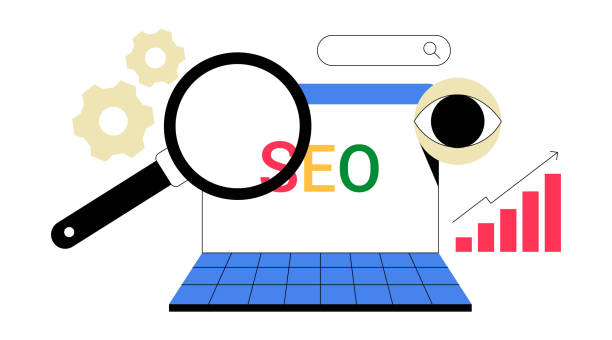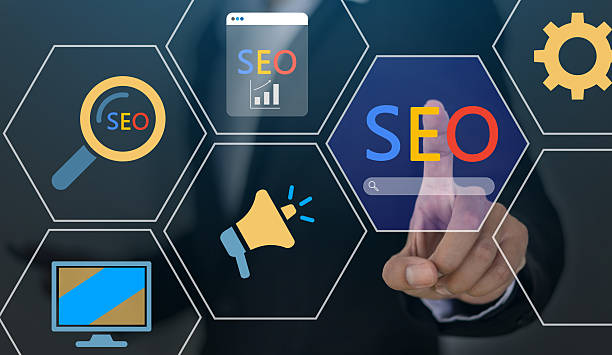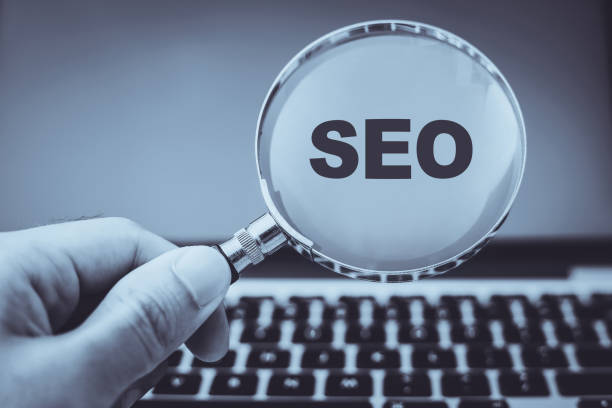What is SEO and why is it important for your business?

What is SEO and why is it important for your business?
#SEO, or Search Engine Optimization, is the process of helping your website achieve a better ranking in search engine results like Google, Bing, and Yahoo.
This process includes a set of techniques and strategies aimed at increasing website visibility, attracting organic (free) traffic, and ultimately increasing sales and revenue.
Simply put, SEO helps you ensure that when your potential customers are looking for a product or service related to your business, your website appears in their search results.
The importance of SEO for businesses is undeniable.
In today’s world, most people use search engines to find information, products, and services they need.
If your website doesn’t rank well in search results, your potential customers are likely to find your competitors.
SEO increases brand awareness, attracts targeted customers, reduces advertising costs, and ultimately increases profitability.
A strong SEO strategy helps you attract consistent, high-quality traffic to your website in the long run.
This traffic consists of people who are looking for a product or service that you offer, so they are much more likely to become customers.
Also, SEO increases user trust and credibility in your website.
A website that ranks well in search results is considered a credible and reliable source.
Are your online sales not what you expect? With Rasaweb, solve the problem of low sales and poor user experience forever!
✅ Increase visitor-to-customer conversion rate
✅ Create an enjoyable user experience and increase customer trust
⚡ Get a free consultation now!
Technical SEO Basics – Proper Infrastructure for Top Ranking

Technical SEO Basics – Proper Infrastructure for Top Ranking
Technical SEO focuses on optimizing the technical aspects of your website for search engines.
The main goal of technical SEO is to ensure that search engines can easily #crawl, #index, and understand your website.
A website with strong technical SEO has a better chance of ranking high in search results.
Some of the most important technical SEO factors include:
- Website loading speed: Website loading speed is one of the most important ranking factors.
Slow websites cause users to flee and reduce ranking in search results.
To improve website loading speed, you can use methods such as optimizing images, using a CDN, and enabling caching. - Responsive Design: Your website should be optimized for display on various devices such as computers, tablets, and mobile phones.
Responsive design ensures that users have a good user experience on any device, which positively affects your website’s ranking. - URL Structure: Your website’s URLs should be short, descriptive, and include relevant keywords.
A proper URL structure helps search engines better understand the content of your pages. - Sitemap: A sitemap is an XML file that introduces all pages of your website to search engines.
A sitemap helps search engines to crawl your website completely. - SSL Certificate: An SSL certificate creates a secure connection between your website and users.
Using an SSL certificate assures users that their information is secure on your website.
Given these factors, SEO technical plays an important role in the overall SEO success of your website.
Keyword Research – Finding the Best Opportunities to Attract Audience

Keyword Research – Finding the Best Opportunities to Attract Audience
Keyword research is the process of identifying the words and phrases that users use to search for information, products, and services they need in search engines.
This process is one of the most important steps of SEO, as it helps us create content that is attractive and relevant to our target audience.
Without accurate keyword research, your SEO efforts may be in vain.
The goal of keyword research is to find words that have high search volume and low competition.
These words help you attract more traffic to your website and at the same time, have a better chance of ranking high in search results.
There are various tools for keyword research, including:
- Google Keyword Planner: Google’s free tool that provides you with information on search volume, competition, and keyword suggestions.
- Ahrefs: A paid tool that offers more advanced features for keyword research, competitor analysis, and ranking monitoring.
- SEMrush: Another paid tool that offers similar features to Ahrefs.
- Moz Keyword Explorer: A paid tool that helps you find relevant and valuable keywords.
When researching keywords, pay attention to the following:
- Search Volume: The number of times a keyword is searched per month.
- Competition: The difficulty of ranking for a keyword.
- Relevance: The relevance of a keyword to your business.
- User Intent: The user’s purpose for searching a keyword.
Using the information obtained from keyword research, you can create content that is attractive and relevant to your target audience and ranks well in search results.
| Keyword | Search Volume (Monthly) | Competition Level |
|---|---|---|
| Buy Sports Shoes | 10,000 | Medium |
| Best Restaurant Tehran | 5,000 | High |
| SEO Training | 2,000 | Low |
On-Page SEO – Optimizing Website Content

On-Page SEO – Optimizing Website Content
On-Page SEO refers to the set of actions taken to optimize website content and page structure.
The goal of on-page SEO is to improve the ranking of website pages in search results and attract more organic traffic.
SEO internal includes optimizing page titles, meta descriptions, main content, images, internal links and other page elements.
The most important on-page SEO factors include:
- Title Tag: The page title is one of the most important ranking factors.
The page title should be descriptive, attractive, and include the page’s main keyword. - Meta Description: The meta description is a short summary of the page’s content that is displayed in search results.
The meta description should be attractive and encouraging to encourage users to click on your website link. - Main Content: The main content of the page should be high quality, relevant, and valuable.
Content should fully answer users’ questions and needs. - Keywords: Keywords should be used naturally in the page title, meta description, main content, and other page elements.
Avoid overuse of keywords. - Images: Images should be optimized and have Alt Text.
Alt Text helps search engines understand the content of the images. - Internal Links: Internal links help search engines understand your website structure and help users easily navigate your website.
By optimizing on-page SEO factors, you can improve the ranking of your website pages in search results and attract more organic traffic.
Do you have an online store but your sales are not what you expect? Rasaweb solves your problem forever by designing professional online stores!
✅ Dramatic increase in conversion rate and sales
✅ Unique user experience for your customers
⚡ Click to get a free consultation with Rasaweb!
Off-Page SEO – Increasing Website Credibility

Off-Page SEO – Increasing Website Credibility
Off-Page SEO refers to the set of actions that are performed outside of your website and are aimed at increasing the credibility and trust in your website.
The most important factor of off-page SEO is link building.
Link building means receiving links from other websites to your website.
The more inbound links to your website and the higher the quality of these links, the more credible your website will be and the better your ranking in search results will be.
Off-page SEO signals to search engines that your site is credible, relevant, and reliable.
In addition to link building, other off-page SEO factors include:
- Presence on Social Networks: Being active on social networks and sharing your website content on these networks can help increase awareness of your brand and drive traffic to your website.
- Content Marketing: Creating and publishing high-quality, valuable content can help attract links from other websites and increase the credibility of your website.
- Branding: Creating a strong and credible brand can help increase user trust in your website and improve your ranking in search results.
- Brand Mentions: Wherever your brand name is mentioned on other websites, without necessarily having a link to your website, it can help your off-page SEO.
Off-page SEO plays an important role in the overall SEO success of your website.
By increasing the credibility of your website, you can improve your ranking in search results and attract more organic traffic.
User Experience (UX) and SEO – An Inseparable Relationship

User Experience (UX) and SEO – An Inseparable Relationship
User Experience (UX) refers to the feeling and experience that users have when using your website.
A good user experience makes users enjoy your website, easily access the information they need, and ultimately become customers.
A bad user experience can cause users to flee and reduce your website’s ranking in search results.
UX is designing and presenting a product or system in a way that is easy, enjoyable, and efficient to use.
Google is increasingly emphasizing user experience as a ranking factor.
Websites that offer a good user experience rank better in search results.
For example, if your website has a slow loading speed, has a poor design, or its content is disorganized and difficult, users will quickly leave your website and this will negatively affect your website’s ranking.
To improve the user experience of your website, you can take the following steps:
- Improve Website Loading Speed: Optimize website loading speed so that users do not have to wait.
- Responsive Design: Optimize your website for display on various devices (computer, tablet, mobile).
- Easy Navigation: Design your website structure so that users can easily access the information they need.
- Readable Content: Use appropriate fonts, contrasting colors, and sufficient whitespace to create readable content.
- Prevent 404 Errors: Remove 404 pages or redirect them to relevant pages.
By improving the user experience of your website, you can keep users satisfied, reduce the bounce rate, and improve your website’s ranking in search results.
SEO essentially means providing the best experience to the user.
Competitor Analysis in SEO – Learn from Your Competitors and Outperform Them

Competitor Analysis in SEO – Learn from Your Competitors and Outperform Them
Competitor analysis is one of the most important steps of SEO.
By analyzing your competitors, you can identify their strengths and weaknesses, model their successful strategies, and avoid their mistakes.
The goal of competitor analysis is to find opportunities that you can use to outperform competitors and improve your website’s ranking.
When analyzing competitors, pay attention to the following:
- Keywords: What keywords are your competitors using?
- Content: What type of content do they produce? How is the quality of their content?
- Link Building: From which websites have they received links? How is the quality of these links?
- Social Networks: On which social networks are they active? How do they use social networks for marketing?
- User Experience: How is the user experience of their website?
There are various tools for competitor analysis, including Ahrefs, SEMrush, Moz Keyword Explorer
Using the information obtained from competitor analysis, you can improve your SEO strategy and outperform competitors.
| Competitor Name | Main Keywords | Strengths | Weaknesses |
|---|---|---|---|
| Competitor Site 1 | SEO Training, Site SEO | High-quality content, strong link building | Low loading speed, old design |
| Competitor Site 2 | Buy Backlinks, SEO Services | Reasonable price, strong support | Low content, poor user experience |
| Competitor Site 3 | Local SEO, Store SEO | Strong local SEO, modern design | Low specialized content, weak presence on social networks |
Local SEO – Attracting Customers from Nearby Areas

Local SEO – Attracting Customers from Nearby Areas
Local SEO focuses on optimizing your website and online business profile to attract customers from nearby geographic areas.
If you own a local business, SEO local is essential for you.
Local SEO helps you get seen in local search results (such as Google Maps search results) and other local platforms.
The most important local SEO factors include:
- Google My Business: Creating and optimizing a Google My Business profile is one of the most important local SEO actions.
Provide accurate and complete information about your business in this profile, including name, address, phone number, hours of operation, photos, and videos. - Registration in Online Directories: Register your business in local and specialized online directories.
- Local Link Building: Receive links from local websites and local organizations.
- Customer Reviews: Ask your customers to post their reviews about your business on Google and other platforms.
Responding to customer reviews (both positive and negative) is also important. - Local Keywords: Use local keywords in your website content.
- Address and Phone Number on the Website: Put your address and phone number on all pages of your website (especially in the footer).
By optimizing local SEO factors, you can improve your business ranking in local search results and attract more customers from nearby areas.
Did you know that a poorly designed online store can drive away up to 70% of your potential customers? Rasaweb will transform your sales by designing professional and user-friendly online stores.
✅ Dramatic increase in sales and revenue
✅ Complete optimization for search engines and mobile
⚡ [Get a free consultation from Rasaweb]
Measuring and Analyzing SEO Results – Measuring Success and Improving Performance

Measuring and Analyzing SEO Results – Measuring Success and Improving Performance
Measuring and analyzing SEO results is essential to measure the success of your SEO strategy and identify opportunities for improvement.
Without measuring and analyzing, you cannot understand whether your SEO efforts are yielding results or not.
Also, you cannot understand which aspects of your SEO strategy are effective and which aspects need improvement.
The most important Key Performance Indicators (KPIs) for measuring SEO results include:
- Organic Traffic: The amount of traffic that enters your website through organic search results.
- Keyword Ranking: Your website’s ranking for target keywords in search results.
- Click-Through Rate (CTR): The percentage of users who click on your website link after seeing it in search results.
- Bounce Rate: The percentage of users who leave your website after entering one page of your website, without visiting other pages.
- Time on Site: The amount of time users spend on your website.
- Conversion Rate: The percentage of users who take a desired action (such as purchasing a product or signing up for a newsletter) after entering your website.
There are various tools for measuring and analyzing SEO results, including Google Analytics, Google Search Console.
Using the information obtained from measuring and analyzing SEO results, you can improve your SEO strategy and optimize your website performance.
The Future of SEO – New Trends and Upcoming Changes

The Future of SEO – New Trends and Upcoming Changes
The world of SEO is constantly changing and evolving.
Search engine algorithms are constantly updated and new trends emerge.
To succeed in SEO, you must always be aware of new trends and adapt your SEO strategy to these changes.
Some of the important SEO trends in the future include:
- Artificial Intelligence (AI): Artificial intelligence will play an increasing role in SEO.
Search engines use artificial intelligence to better understand the content of websites and provide more relevant search results to users. - Voice Search: With the increasing use of smart devices, voice search is becoming a popular method for searching for information.
- Mobile Search: Most users access the Internet through mobile devices.
Therefore, optimizing the website for mobile devices is very important. - Video Content: Video content is becoming one of the most popular types of content.
- User Experience (UX): User experience will continue to be an important ranking factor in SEO.
To succeed in SEO in the future, you should focus on creating high-quality and valuable content, optimizing the website for mobile devices, improving user experience and using new technologies such as artificial intelligence.
SEO effective in the future means being up to date with the latest changes
Frequently Asked Questions
| Question | Answer |
|---|---|
| What is SEO? | SEO, or Search Engine Optimization, is a process to increase the quality and quantity of website traffic by improving the site’s ranking in the natural (organic) results of search engines such as Google. |
| What are the main types of SEO? | SEO is divided into three main categories: On-Page SEO, Off-Page SEO, and Technical SEO. |
| What does On-Page SEO include? | On-Page SEO includes optimizing the elements within the website, such as keywords, Title Tag, Meta Description, content, URL structure, images, and internal links. |
| What is Off-Page SEO? | Off-Page SEO refers to activities outside the website that help improve its ranking, such as Backlink Building, social media marketing, and Brand Mentions. |
| What is Technical SEO? | Technical SEO focuses on optimizing the technical aspects of the website to help crawl and index better by search engines. This includes site speed, mobile-friendliness, site structure, Sitemaps, and the Robots.txt file. |
| What role do Keywords play in SEO? | Keywords are the phrases that users enter into search engines. Proper and targeted use of relevant keywords in content and site elements helps search engines understand your page’s topic and display it in related searches. |
| What is a Backlink and why is it important? | A backlink or inbound link is a link from one website to another. Backlinks act as a “vote of confidence” from other sites for search engines and play an important role in the credibility and ranking of the site, especially if they are from reputable sites. |
| How does Quality Content affect SEO? | High-quality, relevant, comprehensive, and unique content not only attracts and retains users, but also shows search engines that your page is valuable. This helps improve ranking, reduce Bounce Rate, and increase user time on site. |
| Why is site loading speed important for SEO? | Site loading speed is an important ranking factor for Google. Faster sites provide a better user experience, have lower bounce rates, and are preferred by search engines. |
| Is SEO a one-time process? | No, SEO is a continuous and long-term process. Search engine algorithms are constantly changing, competition is increasing, and site content also needs to be updated. Therefore, SEO requires continuous monitoring, analysis, and optimization. |
And other services of Rasa Web Advertising Agency in the field of advertising
Smart Direct Marketing: A dedicated service for SEO ranking growth based on attractive user interface design.
Smart Social Media: A new service to increase customer behavior analysis through intelligent data analysis.
Smart SEO: A fast and efficient solution for online growth with a focus on precise audience targeting.
Smart Link Building: An effective tool to increase sales with the help of an attractive user interface design.
Smart Link Building: A professional solution for digital branding with a focus on precise audience targeting.
And more than hundreds of other services in the field of internet advertising, advertising consulting and organizational solutions
Internet Advertising | Advertising Strategy | Advertorial
Resources
Zoomit: SEO and Website Optimization Training (SEO)
,Web Ramz: What is SEO? Everything about SEO in simple language
,Farazname: What is SEO and why is it important?
,Nakhle Sabz: What is SEO? Comprehensive and Complete SEO Training
? To reach the peak in the digital space and reach a wider audience, Rasaweb Afarin Digital Marketing Agency smoothens the path to your business’s success by providing services such as responsive website design and professional optimization.
📍 Tehran, Mirdamad Street, next to the Central Bank, South Kazeroun Alley, Ramin Alley No. 6




